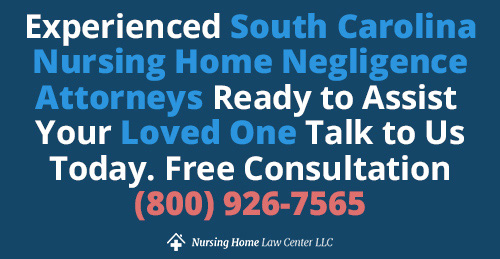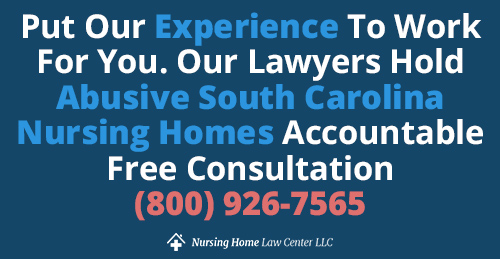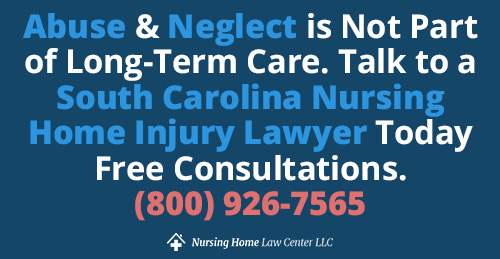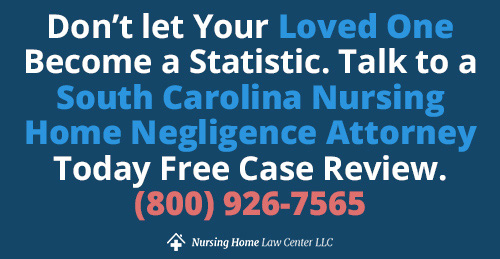legal resources necessary to hold negligent facilities accountable.
Nursing Home Abuse Lawyer South Carolina
 Nursing home abuse represents a distressing breach of ethical and legal responsibilities towards our elders. It encompasses a range of harmful behaviors, from physical assault to emotional neglect, deeply impacting the lives of vulnerable nursing home patients.
Nursing home abuse represents a distressing breach of ethical and legal responsibilities towards our elders. It encompasses a range of harmful behaviors, from physical assault to emotional neglect, deeply impacting the lives of vulnerable nursing home patients.
Nursing Home Law Center, LLC specializes in meticulously investigating these cases, providing expert legal guidance and representation. Our South Carolina nursing home abuse law firm is dedicated to securing maximum compensation for victims and ensuring such injustices are rightfully addressed.
The Reality of Elder Abuse in South Carolina Nursing HomesElder abuse in South Carolina nursing homes is a disturbing and often hidden problem. While the state's elderly population deserves care and respect, many suffer from various forms of abuse, including physical, emotional, and financial mistreatment.
The issue of abusive behavior is not just a legal matter but a moral one. It's imperative to understand that South Carolina nursing home abuse lawyers are more than just legal representatives; they are advocates for human dignity and respect.
Our nursing home abuse lawyers play a pivotal role in safeguarding the rights and well-being of these vulnerable individuals. Our legal professionals tirelessly work to ensure that nursing homes are held accountable for their actions, offering a voice to those who may otherwise go unheard.
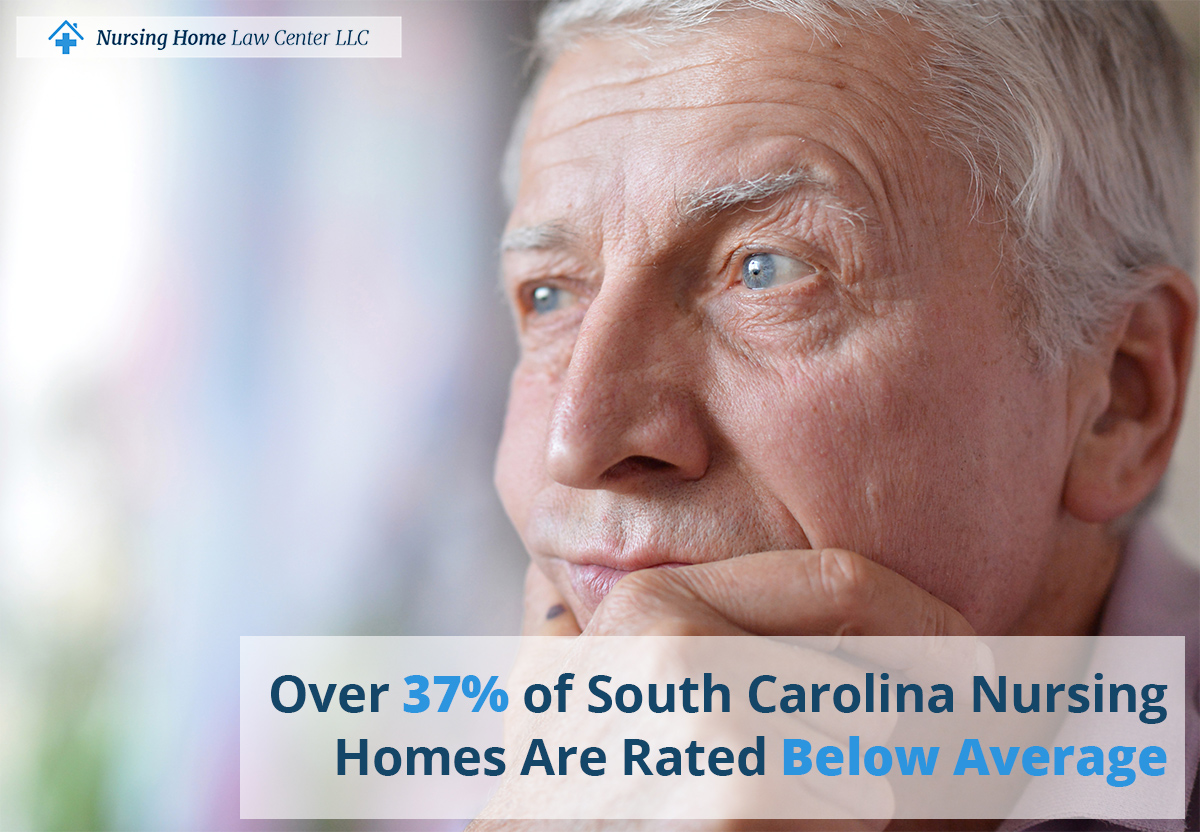 Understanding the Scope of Statewide Abuse and Mistreatment
Understanding the Scope of Statewide Abuse and MistreatmentIt's essential to recognize the prevalence and severity of abuse, mistreatment, and neglect in caregiver homes. While official statistics shed light on reported cases, the actual extent of abuse in nursing facilities can be further-reaching, with numerous instances going unreported. Knowing about the underreporting is crucial in the fight against abuse and neglect, as it highlights the hidden suffering endured by residents.
Prevalence and Severity of Mistreatment: Abuse StatisticsIn 2017, a World Health Organization (WHO) elder abuse study unveiled a disturbing statistic: more than sixty-four percent of long-term care and nursing home staff admitted their involvement in abuse incidents within the past year. This revelation is deeply troubling.
The levels of mistreatment, abuse, and neglect in caregiving facilities include the following:
- Physical Abuse: Injuries such as bruises, cuts, or broken bones, often unexplained or inconsistently explained by staff members.
- Emotional Abuse: Signs of depression, withdrawal, or fear, especially in the presence of certain staff members or other residents.
- Sexual Abuse: Indications of non-consensual sexual contact, including physical signs or sudden changes in behavior.
- Financial Exploitation: Unexplained withdrawals from bank accounts, changes in wills, or missing personal belongings.
- Neglect: Signs of poor hygiene, malnutrition, or untreated medical conditions, suggesting a lack of proper care due to nursing home negligence and medical malpractice.
It is essential for anyone suspecting the abuse of a loved one in a nursing home or assisted living facility to seek the expertise of a South Carolina nursing home abuse lawyer.
Disturbing South Carolina Nursing Home StatisticsThe Centers for Medicare and Medicaid Services (CMS) has shed light on a troubling reality within the South Carolina nursing home and assisted living facility landscape. According to CMS findings in December 2023, 87 out of 189 nursing facilities in South Carolina, accounting for 46% of the total, are rated as "below average" or "much below average" regarding the quality of care they provide residents.
Inspectors have cited numerous nursing facilities for instances of abuse, further compounding the issue. The following is a list of the nursing homes in South Carolina that have received such unfavorable ratings, indicating subpar quality of care and potential risks of mistreatment:
- Angel Oak Nursing and Rehabilitation Center
- Brian Center Nursing Care - St Andrews
- Calhoun Convalescent Center
- Carlyle Senior Care of Aiken
- Carlyle Senior Care of Williston
- Cheraw Healthcare
- C M Tucker Jr Nursing Care
- Condor Health Anderson
- Magnolia Manor - Inman
- Magnolia Manor - Spartanburg
- Magnolia Place - Spartanburg
- Martha Franks Baptist Retirement Center
- Morrell Nursing Center
- Pruitthealth- Bamberg
- Pruitthealth- Columbia
- Pruitthealth- North Augusta
- Pruitthealth- Ridgeway
- Rehab Center of Cheraw
- Richard M Campbell Veterans Nursing Home
- Simpsonville Post Acute
- Springdale Healthcare Center
- St George Healthcare Center
- West Village Post Acute
- White Oak Estates
These statistics underscore the pressing need for increased oversight and accountability within South Carolina nursing homes. Families and individuals seeking care for their loved ones must exercise caution and due diligence when selecting a nursing facility.
The safety and well-being of residents should always be paramount, and it is imperative to address these issues to ensure that vulnerable individuals receive the quality care they deserve.
The Alarming Resident-to-Resident Violence in Nursing HomesResident-to-resident violence within caregiving homes is an unsettling issue that demands attention and action. These incidents encompass various forms of harm inflicted by one resident upon another, including:
- Physical abuse
- Emotional abuse
- Sexual abuse
There is a lack of supervision and inadequate staff training at some facilities, which can contribute to victims being harmed by their fellow residents.
The consequences of insufficient supervision within caregiving homes extend beyond the immediate risk of resident-to-resident violence and can result in residents suffering the following:
- Inadequate care
- Neglect
- Being deprived of the necessary attention to maintain their physical and emotional well-being
- Unmet medical needs
- Improper hygiene
- Lack of social engagement
It becomes crucial for families and guardians to advocate for their loved one's rights and well-being within caregiving homes, emphasizing the importance of a supportive and attentive environment for all residents.
Nursing Home Wrongful Death: a Devastating ConsequenceNursing home wrongful death is a profoundly tragic outcome that can result from a range of distressing circumstances within these facilities. It is an agonizing reality for surviving family members when a loved one's death is linked to the following:
- Nursing home neglect
- Physical abuse
- Financial exploitation
- Sexual abuse
In cases of nursing home wrongful death, it is essential to recognize the common signs of abuse and neglect. These can include unexplained injuries, changes in behavior, a lack of hygiene, or even physical violence. The surviving family of the victim must consider their options, including the pursuit of a wrongful death claim, to seek justice and hold those responsible accountable.
While nursing home staff may sometimes admit to negligence or abuse, the assistance of personal injury lawyers or trial lawyers experienced in nursing home abuse and neglect cases can be invaluable in navigating the legal complexities surrounding wrongful death cases stemming from abusive behavior. These professionals can provide crucial support to ensure that grieving families receive the closure and compensation they need in the wake of their loved one's death.
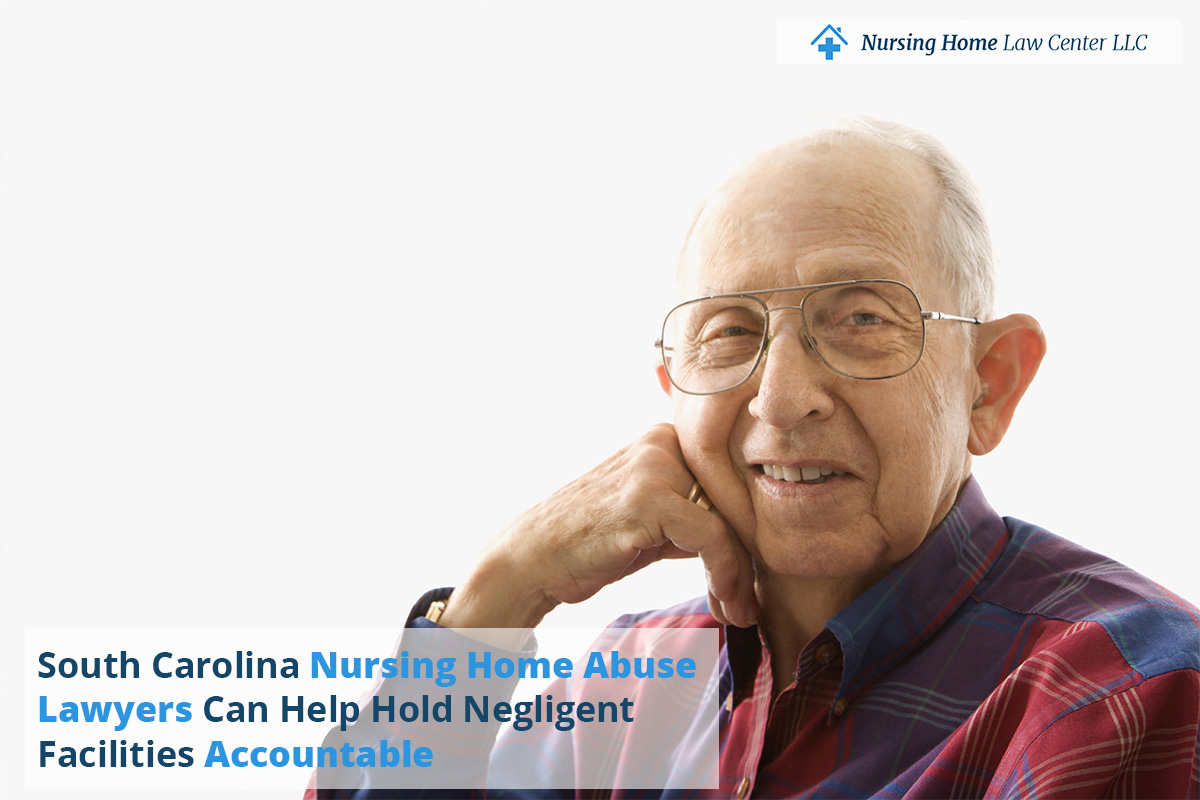 Legal Rights of Nursing Home Residents
Legal Rights of Nursing Home ResidentsNursing home residents have specific legal rights designed to protect them from abuse and neglect. Understanding these rights is crucial for both residents and their families. These rights, governed by state and federal law, include the right to be treated with dignity and respect, the right to privacy, and the right to be free from all forms of abuse and neglect.
State and Federal ProtectionsSouth Carolina law and the Federal Nursing Home Reform Act of 1987 provide robust protections for nursing home residents. These laws stipulate standards for care, staffing, and resident treatment. They also outline the legal obligations of nursing facilities to ensure the safety and well-being of their residents. Understanding these protections is essential for ensuring that nursing home residents receive the care and respect they deserve.
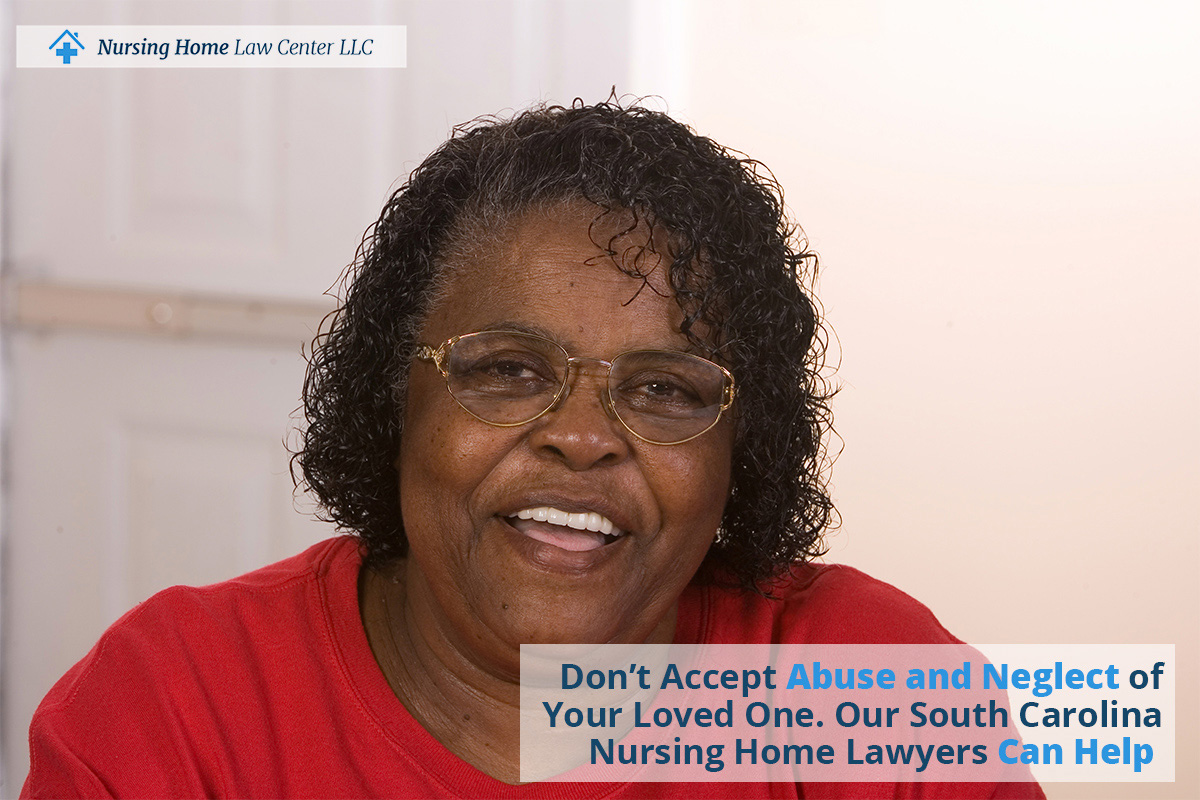 Identifying Signs of Abuse and Neglect
Identifying Signs of Abuse and NeglectEnsuring the safety and well-being of nursing home residents is of utmost importance, making it crucial to identify signs of abuse and neglect within these care facilities. Abuse and neglect can take various forms, each with its own set of indicators. Visitors, staff, and members of the family should remain vigilant and attentive to any alterations in a resident's physical condition or behavior, as these may provide valuable clues that point to nursing home neglect or abuse.
Recognizing the Warning Signs- Physical Injuries: Unexplained bruises, cuts, or other injuries on the resident's body may indicate physically abusive behavior or improper care.
- Behavioral Changes: Sudden and noticeable changes in a resident's behavior, such as increased fearfulness, withdrawal from social interactions, or signs of depression, should raise concerns about emotional or psychological abuse.
- Financial Irregularities: Be alert to any unexplained bank withdrawals, changes in financial documents, or suspicious financial transactions involving the resident. Financial exploitation is a form of abuse that can leave the elderly vulnerable to exploitation by unscrupulous individuals.
- Medication Mismanagement: Keep an eye out for irregularities in medication administration, including overmedication or undermedication. Improper medication management can have severe consequences for a resident's health and well-being.
- Bedsores and Neglected Hygiene: The presence of bedsores, as well as poor personal hygiene, can be indicative of nursing home neglect. These physical manifestations can result from inadequate care and should not be ignored.
- Weight Loss and Malnutrition: Significant and unexplained weight loss or signs of malnutrition may suggest that a resident is not receiving proper nutrition or care, raising concerns about neglect.
- Unsanitary Living Conditions: Observe the cleanliness of the resident's living environment. Dirty or unsanitary conditions can be a sign of neglect and pose health risks to residents.
- Inadequate Staffing: Pay attention to the availability of nursing facility staff. A consistent lack of staff members to meet residents' needs can lead to neglect and diminished care quality.
In residential nursing care facilities, inappropriate behavior can arise from various underlying causes, and understanding these reasons is crucial for addressing the issue effectively. However, an alarming concern is that incidents of inappropriate behavior often go unnoticed or unreported in some facilities, leading to a lack of oversight and persistent problems.
Underreporting Inappropriate BehaviorOne significant challenge in addressing inappropriate behavior within residential nursing care facilities is the underreporting of incidents. Many cases may go unreported due to various reasons, including:
- Residents fear of retaliation
- Staff members' reluctance to document incidents
- Lack of awareness about the proper reporting procedures
When these incidents are not documented and addressed promptly, they can lead to a lack of oversight, allowing inappropriate behavior to persist.
Escalation of Behavior Issues
When inappropriate behavior goes unreported or unaddressed, it can escalate over time, creating ongoing problems within the facility. Nursing home residents may experience discomfort, distress, or fear due to the actions of their fellow patients or staff members. The failure to intervene and provide appropriate care can exacerbate these issues, ultimately compromising all residents' quality of life and well-being.
Complex Underlying Causes of Inappropriate BehaviorIdentifying and addressing these underlying causes of inappropriate behavior are essential steps in management and nursing home abuse prevention. Inappropriate behavior in residential nursing care may be linked to various factors, including:
- Cognitive decline
- Mental health issues
- Unmet medical needs
- Social isolation
However, when facilities do not have proper reporting mechanisms or oversight, these root causes may remain unexplored, leaving nursing home residents vulnerable to continued inappropriate behavior.
Addressing the most common reasons for inappropriate behavior in residential nursing care requires a multifaceted approach, including:
- Improving reporting and oversight mechanisms
- Training staff members on identifying and addressing inappropriate behavior
- Addressing the underlying causes that may contribute to these incidents
These steps can create a safer and more supportive environment for all nursing home residents needing care.
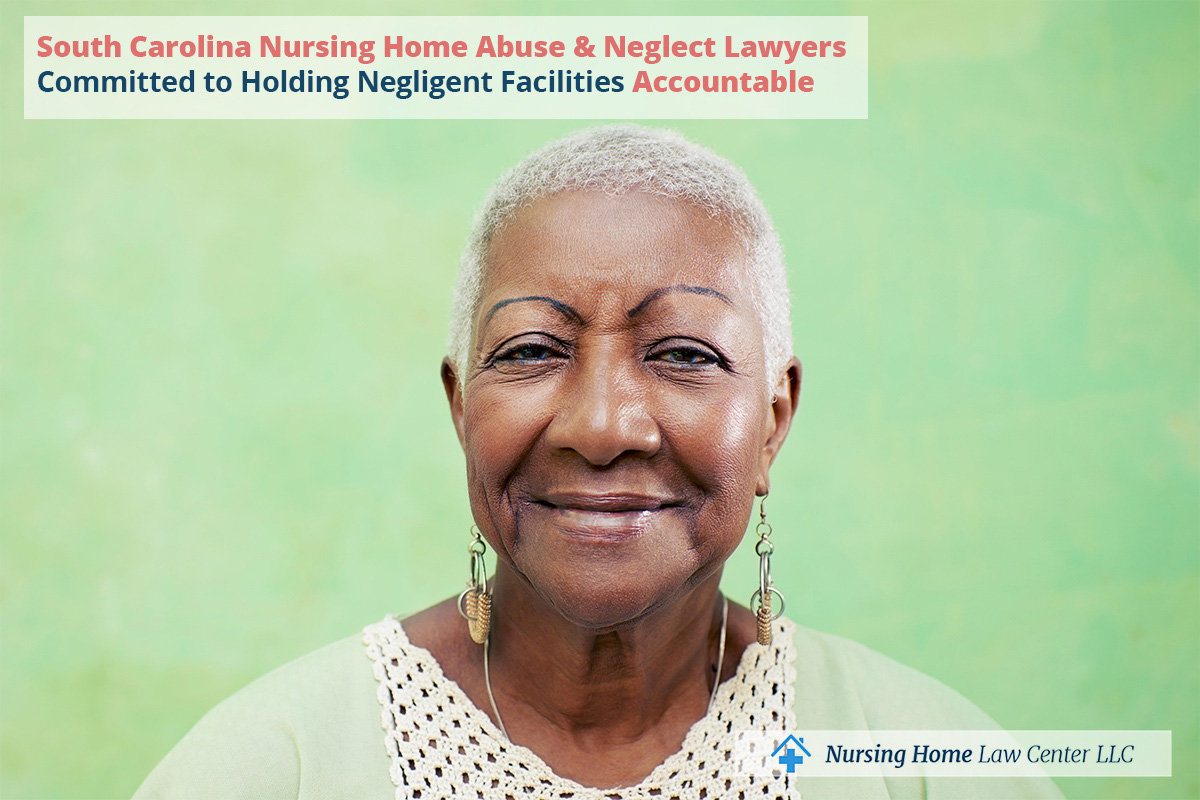 Taking Action Against Nursing Home Abuse
Taking Action Against Nursing Home AbuseWhen abusive or negligent behavior is suspected, taking immediate action is crucial. This includes ensuring the safety of the abused individual and gathering evidence of the abuse. Reporting the nursing home abuse to the appropriate authorities is also essential for ensuring that the abuse is investigated and that the perpetrators are held accountable.
Steps to Address Suspected AbuseIf abuse or neglect is suspected, immediate steps should be taken, including removing the nursing home resident from the harmful environment and documenting any evidence of abuse.
The South Carolina Department of Health and Environmental Control takes nursing home abuse and neglect cases seriously, emphasizing the need for proper oversight and accountability. The agency accepts complaints online or by phone at (800)922-6735. Reporting abuse to the South Carolina Long-Term Care Ombudsman Program and Adult Protective Services ensures a proper investigation and response.
Legal Recourse for South Carolina Nursing Home Abuse ClaimsWhen nursing home abuse occurs, victims and their families have legal avenues to pursue justice and obtain compensation for the harm suffered. These legal remedies are essential to hold those responsible accountable and provide financial relief for the victims and their families who have endured physical and emotional distress. It is imperative for victims and their loved ones to be well-informed about their rights and the legal processes involved in seeking reparation for the injustice they've endured.
Compensation: Seeking Justice and ReparationsBy seeking justice and reparations, abused victims can not only hold negligent or abusive staff members and facilities accountable but also find financial relief to cover their medical bills and emotional suffering.
To pursue legal recourse and obtain just compensation through a lawsuit settlement for nursing home abuse, victims and their families can consider the following options and factors:
- Medical Expenses: Abused victims may be entitled to compensation for their medical costs, including hospital bills and ongoing medical treatments required as a result of the abuse. This financial relief can help alleviate the burden of these costs.
- Pain and Suffering: Abused victims often experience physical and emotional trauma. Compensation for pain and suffering aims to provide recompense for the pain, anguish, and psychological distress endured during and after the abusive incidents.
- Statute of Limitations: Understanding the time frame for filing a claim is crucial. Victims and their families should be aware of the statute of limitations, which sets a deadline for bringing legal action. Being aware of this timeframe is essential to ensure that their right to seek justice is preserved.
- Punitive Damages: In some instances where the nursing facility staff's actions were particularly egregious, punitive damages may be awarded. These damages are meant to punish the wrongdoers and deter similar conduct in the future.
- Legal Representation: Seeking justice for abuse or negligence takes the expertise of experienced personal injury lawyers, nursing home attorneys, or trial lawyers specializing in cases. These legal professionals can guide victims and their families through the complex legal process and protect their rights.
Victims and their families should consult with a knowledgeable nursing home abuse attorney who can advocate on their behalf and help them navigate the legal complexities associated with these cases.
The Role of a South Carolina Nursing Home Abuse LawyerA nursing home abuse lawyer plays a crucial role in addressing the issue of nursing facilities. Our legal professionals have the expertise and resources to investigate abuse claims, represent victims in court, and work towards obtaining fair compensation for the harm suffered.
Engaging the services of an experienced nursing home abuse attorney is crucial for victims and their families, as these professionals can provide valuable assistance in various ways, including:
- Investigation: Gathering evidence and building a solid case.
- Representation: Advocating for victims in legal proceedings.
- Compensation: Ensuring victims receive fair financial reparation.
If your family member has endured nursing home abuse or neglect, the path to justice and financial compensation begins with a call to the Nursing Home Law Center, LLC at (800)926-7565. Our nursing home abuse attorneys are well-versed in South Carolina nursing home laws and are committed to upholding the rights of your loved ones.
Our neglect attorneys provide:
- Free case evaluation for nursing home negligence and abuse cases
- Legal action against physical abuse and emotional abuse in assisted living facilities
- Seeking redress for nurses' and certified nursing assistants' negligence or abuse
- Guidance for family members pursuing wrongful death claims under the Nursing Home Reform Act of 1987
- Legal advice on Department of Health regulations and medical malpractice concerns
- Recovery of medical care costs and financial compensation
- Legal strategies to address life-changing injuries caused by abuse or neglect
Trust our nursing home abuse attorneys to offer comprehensive support if you suspect abuse, including serious injuries or poor hygiene issues caused by nursing home staff members.
 South Carolina Nursing Home Injury Lawyer Nursing Home Law Center LLC Home
South Carolina Nursing Home Injury Lawyer Nursing Home Law Center LLC Home
